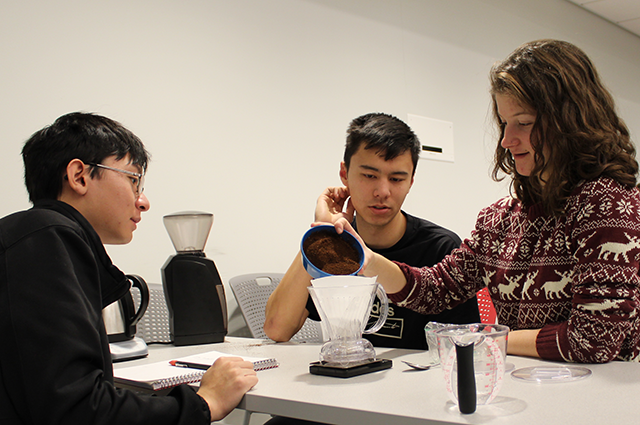Engineering a future

The final week of classes can be a stressful time for students, but not necessarily for students enrolled in Introduction to Engineering (EN-1) at Tufts School of Engineering. These first-year students are in the classrooms putting the final touches on their coffee brewing contraptions, their golf swing trainers, and their Shark Tank-style civil infrastructure pitches. You might even see them in the hallway playing with toys they invented for middle school-aged children.
According to Ethan Danahy — research assistant professor at the Center for Engineering Education and Outreach (CEEO), Tufts alumnus (E00, EG02, and EG07), and coordinator of first-year engineering courses — this celebratory conclusion to a student’s first semester studying engineering is all by design.
“We want those first experiences that students have to be good and representative of what the rest of their academic career will be like, and to get them excited about pursuing engineering,” says Danahy, a triple Jumbo who attended Introduction to Engineering courses in his own days as a Tufts student. “We want students to feel like, ‘Wow, this is awesome.’”
This fall, the School offered 11 different sections of Intro to Engineering. Each section focused on a different topic that not only taught first-year engineers the basics of the field, but also showed them that engineering is everywhere. Students could choose between course sections such as Coffee Engineering, Climate Change Engineering, Inventing Smart Toys for Middle School Kids, Simple Robotics, Music and the Art of Engineering, Bringing Innovation to Engineering for Biomedical Sciences, and Engineering Human Movement. Each course explored the engineering design process through iterative, hands-on projects guided by faculty, whose ranks included deans and department chairs.
Coffee Engineering was one of the most popular introductory courses this fall. Led by Professor and Chair Kyongbum Lee and Associate Professor Matthew Panzer, both of the Department of Chemical and Biological Engineering, this course invited students to examine molecular engineering concepts within the context of coffee brewing. Students learned about energy balances, molecular motion, and physical chemistry by disassembling coffee brewers, roasting their own coffee beans, and investigating the pH level of coffee.
The lessons of Coffee Engineering built up to a final project – a coffee brewing competition in which student groups faced off to make the most energy efficient and best-tasting liter of coffee. Teams were given 45 minutes to brew coffee using coffee beans, a coffee grinder, a hot water kettle, and a filtered dripper. Each team designed its own engineering process to brew the liter of coffee, but their choices were informed by previous coffee brewing labs and the sometimes concerned expressions of the faculty judges. Each team successfully completed the challenge before sharing their coffee with the class. The groups then presented short videos that explained their design choices and intended outcomes.
What Danahy finds most powerful about the array of Intro to Engineering courses is that professors are teaching research topics that they feel strongly about, from coffee to engineering education. “When the professors are motivated and passionate about a subject, that energy translates right down to the students,” he says.
Danahy would know — he took one of the earliest project-based Introduction to Engineering courses. He recalls former professor of mechanical engineering, CEEO co-founder, and chef Ioannis Miaoulis (E83, AG86, EG87, E12P, E15P) teaching a course called Gourmet Engineering. Danahy noticed the popularity of that course and how rare of an opportunity it was to learn about the thermodynamics of cooking a turkey from Miaoulis, who was, at the time, the Dean of the School of Engineering.
Now Danahy seeks to bring that sense of wonder to each introductory engineering course. He taught a Simple Robotics course this fall in which students constructed and programmed robots using the LEGO MINDSTORMS platform.
“I was excited to learn how to design with LEGO and program in Python,” said first-year student Alina Shah. “I loved building creative projects such as a robotic arm, a haunted house, and an astronaut tool.”
Classmate Isabella Bianchi found the class to be similarly engaging. “Learning how to build basic robots, as well as program them, was very exciting to me as someone interested in both mechanical engineering and computer science,” said Bianchi. “The class’s hands-on approach allowed me to learn quickly through trial and error, and by looking at how other groups solved the same problem.”
Danahy encourages faculty to share their research interests with first-year students in an accessible and creative way. The instructors are free to invent their own course topics, but each section should involve team-based problem solving, engage in the ethical and societal context of the subject matter, and help students understand what it means to be an engineer. The course shouldn't just excite students about engineering — it should teach them the keys to success in more advanced engineering research.
“Introduction to Engineering allowed me to develop skills like planning how to engineer tools, troubleshoot mechanical issues, code, and how to use tools in real life,” said student Evan Szablewski. “The class showed me the engineering process and made me very excited to pursue mechanical engineering at Tufts.”
Danahy encourages students to reach out to faculty members for research guidance early in their academic careers, and being in an engineering class that’s led by a department chair or prominent faculty member helps first-year students feel comfortable asking for advice. He suggests that students find a faculty member with similar research interests, and to email them or stop by during office hours to introduce themselves.
“These top professors want to be there [for first-year students], and they’re doing super cool and innovative things,” says Danahy. “It’s pretty amazing.”
Department:
Center for Engineering Education and Outreach